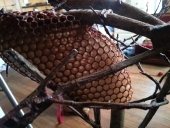
 1
1
















Living in Anjou , France,
For the many not for the few
http://www.permies.com/t/80/31583/projects/Permie-Pennies-France#330873
 3
3




"SONG OF INCREASE: Listening to the Wisdom of Honeybees
for Kinder Beekeeping and a Better World"
http://www.SpiritBee.com
east of Battle Ground, WA (near Vancouver)
Friendly Haven Rise Farm
http://www.FriendlyHaven.com
 5
5





 1
1




 1
1




"SONG OF INCREASE: Listening to the Wisdom of Honeybees
for Kinder Beekeeping and a Better World"
http://www.SpiritBee.com
east of Battle Ground, WA (near Vancouver)
Friendly Haven Rise Farm
http://www.FriendlyHaven.com
 1
1








Jacqueline Freeman wrote:I just went through all the posts on the Flow Hive and have to give y'all a hefty credit for thinking broadly and not jumping on the bandwagon on the first pass.
I'm not a fan for these reasons:
1) I don't like plastic in the hive. The Flow Hive is not just a plastic foundation, the cells are built out to the full depth as well.
2) All the bees have to do is fill it and cap it, but from a side observation window, it's hard to tell if they've capped the whole sheet. To tell that, you'd have to open the hive and look. Otherwise you may be removing nectar that hasn't been turned to honey yet and that won't stay honey, it will ferment (ie, that's how you make mead).
3. I strongly oppose the idea that you can just get a Flow Hive, put bees in it and turn a dial to extract their honey. Bees are SO MUCH MORE COMPLEX than that. I find it very disrespectful to approach bees by looking at what we can get from them. Reducing them to the daily source of honey for your pancakes is (dare I be so bold) abhorrent to me. This idea is what gets humans into trouble over and over. Say I keep six cows in my pasture where they eat grass... but I bet I could fit 50 cows in that same pen and feed them hay instead of having to grow grass. Or how about I boost that to 100 feedlot cows and we feed them leftover bagels and day old Entermans coffee cake (true story) instead of appropriate food? And then we birth feedlots.
That's what I see the Flow Hive as promoting -- bees as another indentured servant whose role is to serve human needs. My first question is always, "Is this something the BEES need? Does this make their lives better? (and I mean from the bee's point of view, not "bee view as humans imagine it"). If it's not good for the bees, I won't use it.
4. What we need is beekeepers who first LOVE their bees and are willing to do anything to give them lives that allow them to express their bee-ness. The primary relationship ought to be based not on taking more from them, it ought to be based on a concerned and caring relationship with them.
Okay, I'm stepping down from my soapbox now.
Jacqueline
Here is my view on life. If whatever you do with your life, doesn't directly screw my life up, then I say you should do it. I am the LEAST judgmental man on the face of the planet. To each their own.




Living in Anjou , France,
For the many not for the few
http://www.permies.com/t/80/31583/projects/Permie-Pennies-France#330873





